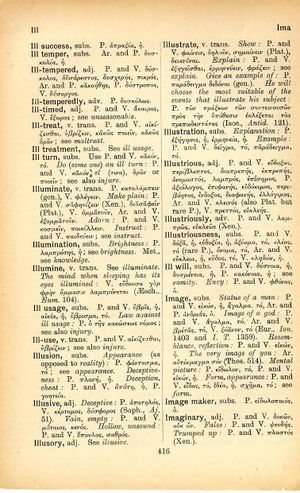illuminate: Difference between revisions
From LSJ
τὸ δ' ἡδέως ζῆν καὶ ἱλαρῶς οὐκ ἔξωθέν ἐστιν, ἀλλὰ τοὐναντίον ὁ ἄνθρωπος τοῖς περὶ αὑτὸν πράγμασιν ἡδονὴν καὶ χάριν ὥσπερ ἐκ πηγῆς τοῦ ἤθους προστίθησιν → but a pleasant and happy life comes not from external things, but, on the contrary, man draws on his own character as a source from which to add the element of pleasure and joy to the things which surround him
(CSV4) |
(6_8) |
||
| Line 5: | Line 5: | ||
<b class="b2">Adorn</b>: P. and V. κοσμεῖν, ποικίλλειν. | <b class="b2">Adorn</b>: P. and V. κοσμεῖν, ποικίλλειν. | ||
<b class="b2">Instruct</b>: P. and V. παιδεύειν; see [[instruct]]. | <b class="b2">Instruct</b>: P. and V. παιδεύειν; see [[instruct]]. | ||
}} | |||
{{Lewis | |||
|lshtext=<b>illūmĭnātē</b>: adv., v. [[illumino]]. | |||
}} | }} | ||
Revision as of 08:13, 13 August 2017
English > Greek (Woodhouse)
v. trans.
P. καταλάμπειν (gen.), V. φλέγειν. Make plain: P. and V. σαφηνίζειν (Xen.), διασαφεῖν (Plat.), V. ὀμματοῦν, Ar. and V. ἐξομματοῦν. Adorn: P. and V. κοσμεῖν, ποικίλλειν. Instruct: P. and V. παιδεύειν; see instruct.
Latin > English (Lewis & Short)
illūmĭnātē: adv., v. illumino.

